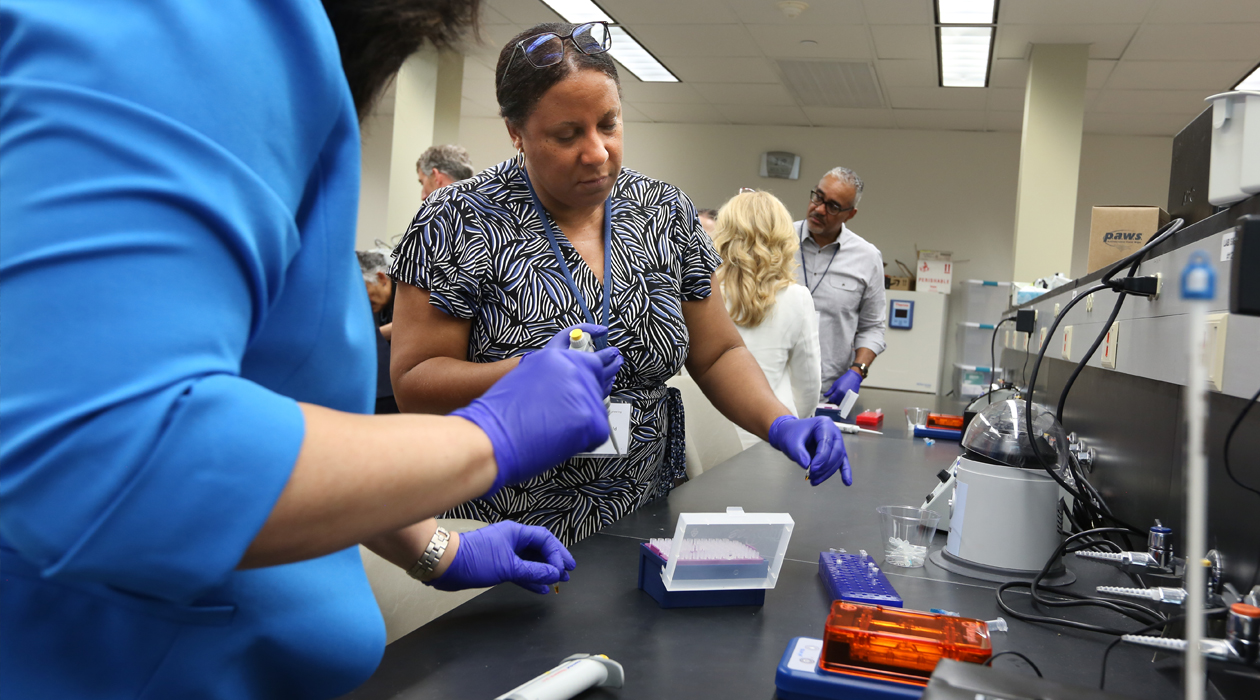Genomics workshop equips judges with knowledge to navigate emerging legal questions

Particpants at the Genomics for Judges event use electrophoresis to test commercially available snacks for traces of GMOs. / Julia Pollack
Advances in genomics research and technology are providing a more comprehensive understanding of how our genetic code interacts with our environment to influence our health, behavior, and overall well-being. This has far-reaching implications for various fields, including healthcare, insurance, policing, and even judicial sentencing. The legal system faces the challenge of protecting individuals from potential misuse of genetic data, such as unfair denial of health insurance, while also allowing for the leveraging of its benefits, like improving early interventions for disease. Addressing these issues requires the judiciary to have a good understanding of genomics, ensuring that they can make informed decisions in cases involving genetic information.
To meet this growing need, the Carl R. Woese Institute for Genomic Biology at the University of Illinois Urbana-Champaign, in partnership with the National Courts and Sciences Institute, recently hosted the third "Genomics for Judges" workshop, which was held from June 27-28th. This workshop aimed to equip judges with the knowledge necessary to navigate the legal landscape shaped by advances in DNA sequencing, analysis, and more recently, artificial intelligence. The workshop was funded by the State Justice Institute.
The two-day workshop offered a comprehensive curriculum that included expert seminars and panels, interactive discussions, and hands-on experiments. Judges explored the latest developments in genomics and AI, increasing their understanding of its applications, implications, and limitations. By examining the intersection of genomics with the legal system, the event sought to prepare judges for the challenges and opportunities these technologies present.
The workshop featured many notable seminars, including one by Derek Hoiem, a professor of computer science, who provided an overview of AI. Hoiem differentiated between traditional narrow machine learning models and emerging generative AI technologies, like ChatGPT. He emphasized the importance of understanding AI's training processes, potential biases, and the role of digital forensics in verifying the authenticity of AI-generated media, a growing concern in legal contexts.
Another notable seminar was led by Brian Allan (IGOH), a professor of entomology, who discussed genetic modification in mosquitoes as a strategy to combat disease spread. He detailed current genetic modification techniques for tackling this, which include creating sterile mosquitoes or those resistant to diseases. Allan then highlighted the regulatory ambiguities surrounding genetically modified organisms and the legal questions judges might face in the future concerning the environmental and ethical implications of GMOs.
Alta Charo, the Warren P. Knowles Professor Emerita of Law and Bioethics at the University of Wisconsin-Madison, delivered a compelling keynote address on equity and access to emerging genome editing therapies. She reviewed recent advancements in genome editing, explaining the underlying mechanisms and the significant hurdles in making these therapies broadly accessible. Charo highlighted challenges such as financial barriers, the complexity of treatments, and the disparities in technological capabilities across different regions. She emphasized the critical role of the judiciary in ensuring that legal decisions regarding these technologies compel companies to address and devise solutions to these equity issues.
Additional seminars covered topics like diagnostics and classifications by AI models, using machine learning to predict health risks based on genomic data, and the future of human genetics in light of technological advances in genetic editing. These sessions underscored the transformative potential of genomics and AI in healthcare and emphasized the need for judicial understanding of these fields.
A highlight of the workshop was a hands-on experiment led by Dan Urban, IGB's Senior Outreach Activities Coordinator. Judges pipetted DNA samples from various commercially available snack foods into gels and used electrophoresis to separate the DNA, testing whether the snacks labeled as GMO-free actually contained GMOs. This experiment offered a practical demonstration of genetic testing techniques and their applications, and it quickly became a favorite among the judicial participants.
Case studies formed another critical part of the workshop, allowing judges to apply their newfound knowledge to hypothetical legal scenarios. In one hypothetical criminal case study, judges considered the legal processes involved in using AI to generate a suspect’s face from DNA evidence at a crime scene. They discussed the potential biases of such AI tools, the types of expert testimony required, and the ethical and legal ramifications of admitting AI-generated evidence in court. Another civil case study explored the idea of a lawsuit involving a genome editing tool used to cure an embryo of a life-threatening disease. In the hypothetical scenario presented, the child later develops cancer, and the parents believe it is related to genome editing. Judges examined the legal procedures for such a lawsuit, the necessary evidence, and the expert testimonies required to resolve the case.
The workshop, titled “AI in Genomics and Genetic Engineering” is part of the IGB’s Genomics forTM program, a series of workshops designed to educate different professional groups on genomics research, and explore with them its potential impact on the job sector they work in.
“The Genomics for program is a prominent element of our efforts in outreach, and a vivid demonstration of our commitment to engage all sectors of the public with clear and trusted information on genomics,” said IGB director Gene Robinson. “We’re pleased and honored to again collaborate with the National Courts and Sciences Institute, one of the premier judicial training organizations in the country.”
The workshop underscored the critical role of education in bridging the gap between advancing technology and the judiciary. By equipping judges with a robust understanding of genomics and AI, the IGB aims to ensure that legal decisions involving these technologies are informed, fair, and just.
